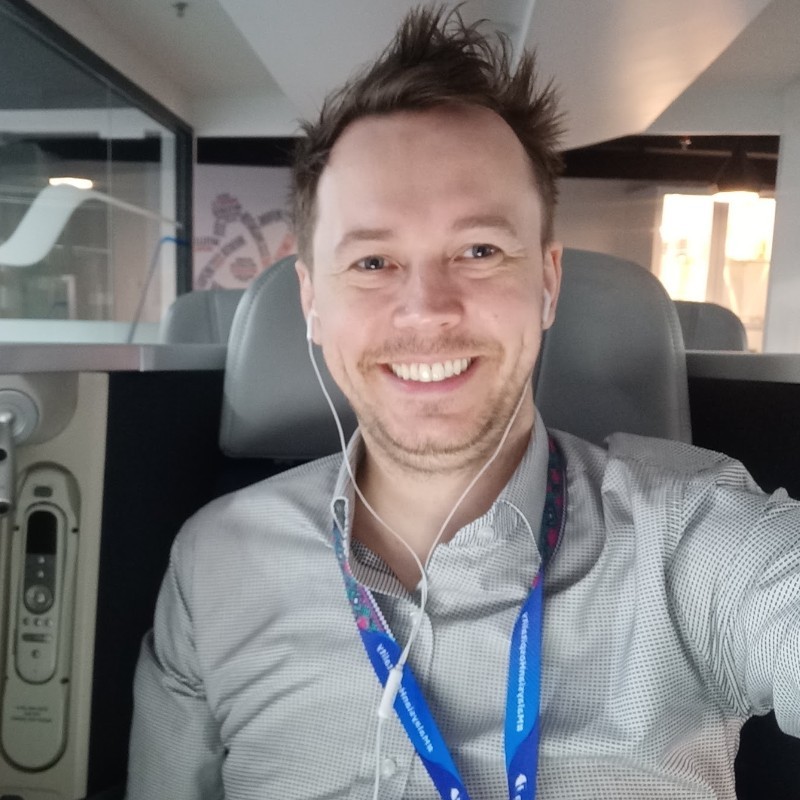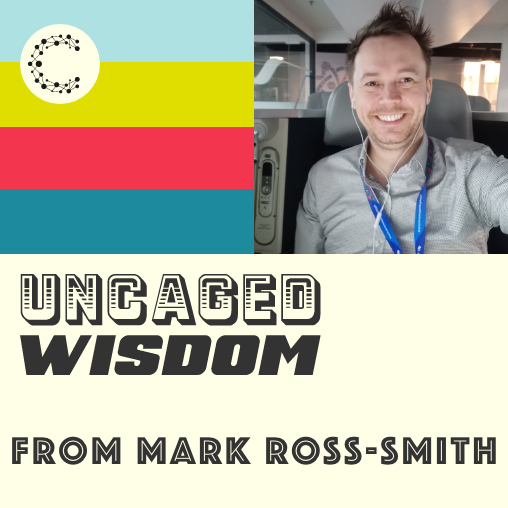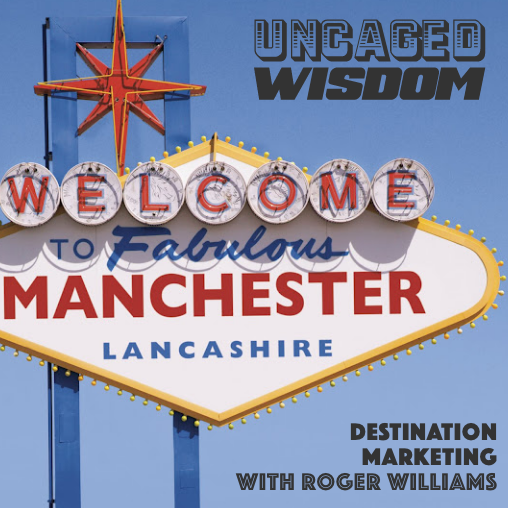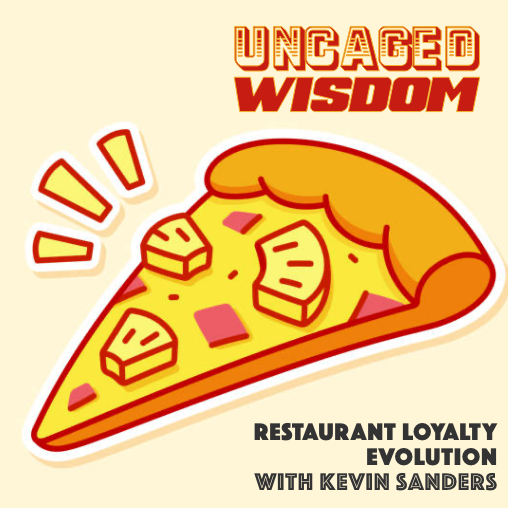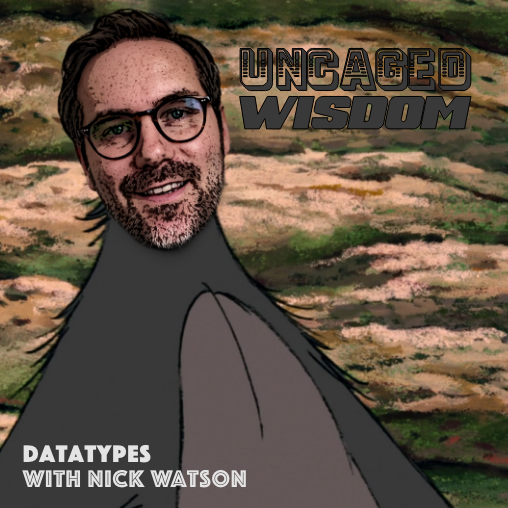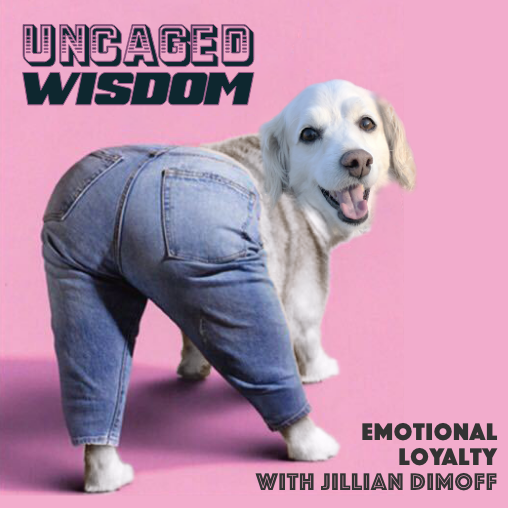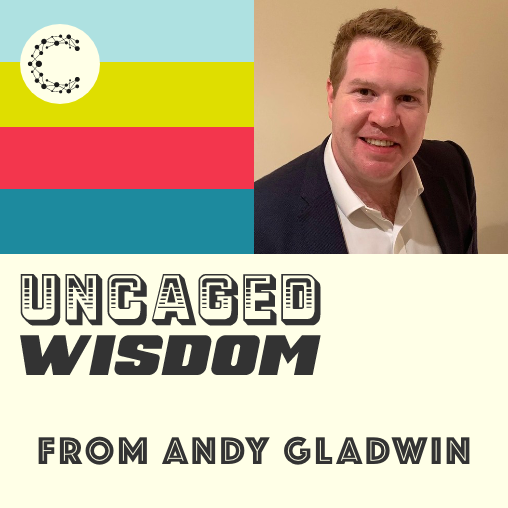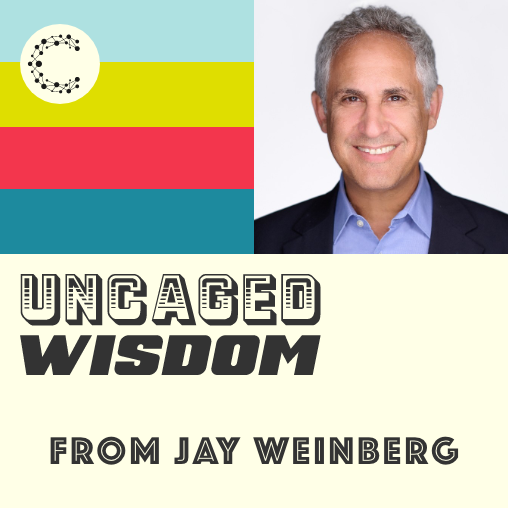The Magic of Loyalty in Travel & Hospitality w/ Mark Ross-Smith
- 0.5
- 1
- 1.25
- 1.5
- 1.75
- 2
Mark Ross-Smith: Well, I mean, first I'd be thinking, how do we engage this Mark guy, he sounds pretty awesome.
Julian: That goes to my question, I'm going to put your number in.
Mark Ross-Smith: I'm going to start getting phone calls at 3: 00 A. M. from random people. No. Thanks.
Voiceover: Uncaged Wisdom, Cheetah Digital's podcast for modern marketing.
Julian: Hello everyone, and welcome back to another episode of Uncaged Wisdom, the podcast for modern marketing practitioners. Today, we are joined by travel loyalty guru and fellow double barreler, Mark Ross- Smith. Mark has run airline loyalty programs, consulted and advised across airline, hotel and telco industries, and is currently CEO at statusmatch. com. This conversation focuses on a recent blog article written by Mark entitled, The Magic of Loyalty, which can be found on traveldatadaily. com. Also, playing the role of Kayla, we have Steve Arsenault, strategic account executive for Cheetah Digital specializing in the travel and hospitality industry. Enjoy the chat. Thank you very much for joining us today. Say hello to our lovely audio listeners.
Mark Ross-Smith: Hello, lovely audio listeners. This is Mark from Malaysia. It's great to be here.
Julian: This is, normally we start off with an icebreaker question, and that's Kayla's domain, but I think Kayla's missed her flight or something, so I'm going to be handling it today. From a traveling experience, what's been one of your most favorite places to visit, or something that happened to you in a certain place?
Mark Ross-Smith: I have traveled a lot and lived in Australia for most of my life, and traveling to Europe and North America quite a lot. A lot of time I'd always fly through Asia to get there, as the stepping stone to sort of get there. And I'd always be traveling through Hong Kong or Singapore. But I'd never stayed there, I just be there for three hours through the transit, buy a couple of drinks in the lounge and then continue on the flight. And I don't know what is about it, but there's always been something magical about Asia. Eventually, I had a busy time, I sold that company and I thought I needed to leave Australia and go to one of these magical places. And so that's actually what led me to Asia. I lived in Hong Kong for many years, now I'm in Malaysia. That's what brought me here, is this magical feeling of traveling through these airports. I really couldn't put my finger on why, but anyone that's sort of been to Hong Kong knows, there's a magic in the air there. There's a vibe about it. It's got this sort of East meets West type feeling, and it's just a great sort of melting pot for business and ideas and travelers.
Julian: Now, before we talk about sort of the main piece today, the magic of loyalty in travel and hospitality, could you tell us a little bit about your career and how obviously you ended up in your current state today and a little bit about status match, please.
Mark Ross-Smith: My travel adventures started taking off in about 2006. My business partner and I, at the time we had a social network in Australia. And so this was about the time we had Myspace and Friendster and Facebook really just sort of come in, evolving as social networks. And so we thought we'll start a social network as well. It was growing a lot. And as part of that, I was sort of the face of the business. I was always traveling around the world. So obviously being in Australia, all these conferences, they're all long haul flights to get there. It's this sort of at least 12 hours to get to America, it's a bit longer to get to Europe. And being Australian, I was flying Qantas quite a lot in long haul. And after a while, I started meeting management in the airline, because I guess I got to this point where you become a little bit more important to the airline and they want to know who you are and what you're doing. And suddenly I got invited to some events that the airline was running. And so I sort of got to meet the right people. And I thought, you know what, if I'm not doing this social network, I want to work in the airline industry because this is really cool. This is really cool stuff. And so that's what really sort of kickstart it all. So when we sold that social network in 2013, and suddenly I was unemployed and what do I do next? Right. So back up bags moved to Asia, and I thought, I'm going to get in the airline industry. I was already in loyalty because I was doing so much in loyalty with telcos already in Australia. And we were making... We really on the retention side, reducing churn with a lot of telcos in Australia. And I thought, how can I apply some of this startup experience and the telco experience in the airline industry? Because from being a passenger and having status on multiple airlines for a long time, I could see ways they can make money, but they just weren't doing it. I don't know why, but they weren't doing it. So, fast forward a few years, immersing myself in that and sort of come along and suddenly I'm running a Malaysia airlines loyalty program. And that's what we started doing there. I started running it like a startup. I thought, let's just make as much money as we can. And Malaysia airlines is always in this position where it's not known for making a lot of money or for not being very profitable. I'm always after that sort of next line of cash. And that's what we did. We just sort of focused on the money. How do we create new products? How do we create new things that just don't exist that people will pay for, that can be beneficial for the airline and for the loyalty program. And then if we fast, fast, fast forward past that again, obviously now I'm back in startup world again, running a company, statusmatch. com, which helps airlines and hotels acquire new high value customers.
Julian: We'll be linking to your blog piece and hopefully stealing a couple of graphics directly from there. So people can help inform the conversation we'll have today. This is about the piece you wrote recently, The Magic of Loyalty. In the piece you talk about the art and the science, which in many ways, they're a bit contradictory, but important segments of any loyalty program. And how could you help set up your thinking around this? And maybe we could break down a couple of those moments.
Mark Ross-Smith: I think that this has evolved over the years. So I'm a bit of a geek. I'm an airline and numbers nerd. And if you read my blog, especially the earlier posts, all about data, all about how to make money out of data, machine learning, algorithms, all this sort of stuff, how to create a propensity model, it's all numbers, numbers, numbers, stuff. And then it is sort of following my journey there, it sort of softened a little bit and it's got into more what I call the art of loyalty. The emotional side of it, which having gone through this journey, I'm really realizing it's probably more powerful than numbers. If you get it right, if you get this emotional side of it right. And so that's why I sort of split them all. I call the business and the numbers side, the science of loyalty and the emotional side, the art of loyalty. So the science of loyalty and how I describe it is, it's the business side, it's the cost of running the program. It's the loyalty platform. It's the CRM, it's the operational expenses. It's the stuff that you just need to run a great loyalty program. You have to have it there. Yeah. And the art of loyalty is how the money's made. So that's where the incremental uplift or revenue or frequency increase from purchase of the customer come from, the arts where the marketing and brand messages sort of begin to shine. I read recently that 95% of all transactions in the world are based on something other than price. So it's convenience or urgency or something else. And these sort of non transactional factors are largely emotional decisions for us. We're emotional creatures, right? It's like, you don't go buying a BMW because you want a four cylinder car, you're buying a BMW purely for emotional reasons. There might be something else driving it, but it's not a price thing, right? Unless you just had to have a BMW. It's something else likely driving that decision made. There's no logical reason to buy one, right? So the question then becomes, how can brands create more of these emotional connections that make up such a large part of the decision making process that the transactional element or the price becomes largely irrelevant in that process? How can brands create that position? And that's going to look different for every customer. So figuring that out is a part of this whole emotional makeup in the art of loyalty. And that's what I call the magic of loyalty is the outcome from that. That's actually when the transaction happens and then figuring out why it happened.
Julian: Ultimately we want that magic of loyalty and airlines hospitality, because we want to make sure that with the relationships you build, when someone decides to fly, they fly with you. When it comes to the magic of loyalty, really, is there a better place of it in action than in airlines and traveling? Is almost the perfect bed inaudible.
Mark Ross-Smith: It totally is. It absolutely is. Think how many times you've flown you watch your movie on the plane. It's a long haul flight and you watch a movie, have you ever noticed, you might get a little bit more emotional watching that movie? Some people cry during movies that you wouldn't otherwise normally cry. And it's a happiness thing, it's not a sad... It's a happiness thing. It's the combination, you're traveling somewhere, you've got people around you don't know, it's the air pressure. You've got all these different factors contributing to this fact that you're in a slightly different emotional state at that point. And when you're in a different emotional state, there's other factors that can then sort of be I'd say injected into your lifestyle at that point, into your sort of sphere at that point, messages at that point, and you could start associating different emotions with that airline, right? So they could be positive or negative. For example, if you're a top tier customer and you're boarding the aircraft and you're in the backer of the aircraft, you're in the middle seat crammed between two large people, and then the cabin supervisor comes down to you before it take off and says, Julian, welcome back. You're our most important customer on the aircraft. Thank you so much for flying with it. Here's a glass of wine from business class, right? That moment, that small moment, right? It's so tiny. It's basically free. It's so powerful. You feel good about it because you got two people next to you that are seeing this whole thing unfolding in front of their eyes as well. Who is this guy? How come he gets this and I don't? You've got the... It's such a small, powerful moment that you instantly, in your head, you'll associate something really good with that airline. And when that is repeated consistently over and over and over and over again, people actually start to fall in love with brands. That's how they do it. It's these small things repeated over and over and over and over and over in positive ways. And when people sort of fall in love with the brand, they don't think twice when they go to book a ticket, they won't go to OTA, they'll go directly to the airline website. They'll sort of have the correct behavior of the perfect customer.
Steve Arsenault: So Mark, you're talking a lot about the emotional effect and what that has, the impact on the brand. But, years and years ago, we really started to focus on the money that comes directly from the program. I mean, I think it started with Air Canada spinning off part of the Aeroplan program. And we see it now with the U. S. Airlines collateralizing their programs. Do you think we've kind of gone too far away from the emotional, do you think we're getting too much into the financial impact and it's becoming all science and no art?
Mark Ross-Smith: I think all these years of building up this emotional side, we'll call it goodwill, building up the goodwill in these programs, and now the programs are cashing in on it. They're cashing in on it through arguably saving airlines through all these capital raisings and sort of the transactional bank. So it's sort of like, I'll explain like, it's emotional input, transactional output. So now we're just seeing the fruits of all the amazing stuff that loyalty teams have been doing for decades all around the world. So I think building on that, to continue this financial success, I think programs need to continue to invest, maybe even double down on the emotional side of it. Because it's clear that it's working. It's a bit hard to connect the dots until something actually transpires the market. But now we're seeing that happen, I think that's solid evidence that loyalty teams could go back and say, you know what? Let's start reinvesting in us again, let's double down on it to really help the airline, really help the program, really help the customers. Let's sort of bring magic, the romance back to flying again.
Steve Arsenault: I love that statement, emotional input, transactional output, because I think that, that's something even the finance people can understand.
Julian: Mark, help me understand, when you were doing the Air Malaysia loyalty program, did you run all of that? Did you set that up or did you help sort of the navigating them through the set up?
Mark Ross-Smith: Oh God, no, I didn't create it. I came in... The program had been running for 30 years before I came along. I just brought a different flavor to the program.
Julian: Yeah.
Mark Ross-Smith: It's sort of been running as a traditional sort of like most Southeast Asian airline programs. There's nothing wrong with them. They work, they just could be improved a bit. And so, we brought a different flavor to what we were doing. We, oh gosh, we had a lot of cool things, we really got to share a lot of partnerships. We brought in some new things that are not quite out in the market yet. Kind of cleaned up a lot of what they had there already, because a lot of... Working in some of these big companies, you're in this bubble all the time. And me, my whole career, I've been sort of traveling around the world, attending events and conferences. And I'm a big fan of these attending events because I feel that's the best way to learn. You get to talk to people that are top of their game. You get to see new people, new cultures, hear new things, sort of networking around the events as well where you get to sort of off the record type stuff and you start learning more. You can't learn that when you're sitting at a desk every day. And so it's not that someone tells you something you could copy, it's that you have this conversation and then someone else comes in and they say something else and in your mind, you connect the dots and boom, there's a spot there, there's sort of eureka moment and you go, why don't we do X? And you go try X and boom, it works out.
Julian: I mean, the reason I was starting to get on just that quick little side route is people are listening to this today. The mixture of people who are pretty specialists in the art and people who also have to worry about the science, as in making sure they go with the right technologies in place. So are there competing forces at work internally when it comes to developing loyalty programs, because you have to have the right technology to really make sure that the best ideas in the art happen.
Mark Ross-Smith: So coming in fresh to this, setting up a program from scratch, you need to get the strategy right first. Yeah, I'd start with that. Before you go down the art road or like the platform side, I would start with a strategy first. Figure out what you're trying to achieve and then make sure that aligns with the financial and non- financial objectives of the organization. And once those sort of, we'll call them railroad tracks, right? Once that's set in place, then you can go along and build the stations along the track, build all the flowers along it and all this sort of pretty stuff. Because you need that foundation there first. Because I mean, you don't want to be in a position where you change a protocol, you launch one in five years time. It's like, well, it's not really working because this over here has cost us this much money, but we can't prove how much is made over here. You need that foundation. You need the strategy right. You need... To be fair, you need management on board. You need from the top. You need the C- levels on board, a hundred percent behind the longer- term strategy because it's not necessarily going to pay off in six months. Now it could be a couple of years depending on the industry, what type of program and where it's going. And it's not always about points of miles and statuses and stuff, but there could be some other business objective that you're trying to achieve. And so that's why that initial strategy piece is so critical. Just to understand where the business wants to go and getting it right. And then on the back of it having, this is almost an ad for Cheetah here, but you getting the right platform is super critical as well because you need a platform that can support your growth through it. If you're going to triple in size of your business over the next two years, you need someone that can sort of go along the ride and support your growth through that. You're going to have new ideas, new features, new... All sorts of new stuff that you want to create at that time and you need to have partners that want to come along for that ride with you.
Julian: People leave. This is a nice thing about it, I think, with loyalty programs with airlines and actually hospitality as well. But most of us have had that moment where you've been hooked in on one way or another when it comes to traveling hospitality. So in your blog, you talk about that two examples. There's one that has been the program owner, which just actually following on from like your experiences as running the Malaysian Airlines one and then also as a flyer. So Steve, get ready because I'm coming to you for this in a minute as well. But Mark, starting with you, as a program owner or like as a flyer yourself, what was a really good example of when that magic in loyalty really sort of landed from an experience?
Mark Ross-Smith: So, one of my most memorable times with Malaysia Airlines is... A bit of a story here. So Malaysia Airlines offices is next to the airport at KLIA, which is about an hour away from the city. And that's where the office... That's where I work basically. And so to come back home every day, I catch a train but I go through the airport because it actually is very fast, efficient, right? So it's basically walking through the terminal to get back home. And I'd leave the office at 6: 00 or 7: 00 o'clock every day. And you've got a bit of time to burn on your way back and being a total aviation geek, you can imagine walking through a terminal gate, it's kind of fun, right? As a geek. And kind of want to do stuff, right. And so there'd be, every week I tried to have a different theme of something I would do on the way back and are all sorts of different stuff. And the one I wrote in the blog was, there's a whole week I decided to give out chocolates to random passengers. And this is my own initiative. I didn't talk to her about it. I bought the chocolates it's in my own time. I literally went to Godiva, bought a bunch of box chocolates every day, hunted down some silver, gold, platinum members in the program, wherever they were, if they were boarding flights or whatever, and I'd just be like, just... It was very random. I'd go out to them and just say, I mean, I'm dressed up, I've got credentials, a name badge and everything. Looking very official and be like, thank you Mr. Da da da for flying with the airline today, we really appreciate your business. This is for you. Have a great flight. Simple as that. No cameras around, no media, no nothing. Just me, just being a total nerd. And I had a lot of fun doing that. The reactions that were coming from the guests I was talking to, I can only describe as these moments of joy. It's totally unexpected, somewhat emotional moment. There was one gentleman when I gave it to, he said," Mark, I'd never met anyone in management from the airline. I'd been very loyal for many years. This means a lot. Thank you so much." Went on to tell me about his story. He was flying to India at the time because he is a doctor and he's working in some sort of medical thing over there. And we spoke for a while and he had a great flight, and hopefully that's a story he shares as well. And this idea... So when I was flying as passion no one gave me chocolates, but it would have been nice. If you're listening, any airlines, I would like chocolates. But it's kind of like, I've had that experience of being on the other side of it as a passenger. And I'm thinking, what would I want? What would be cool in my experience as a passenger? And then since I was in a position to be able to do something, I did it. And it was sort of just almost passing it on, passing the goodness onto the world.
Julian: Brilliant. And you taught me a word, we're going to come onto in a minute, which sort of captures that in its Bondo. And I love a good word, but Steve, actually coming to you, maybe we could do as a flyer on the other side, or actually, you've been in the industry as well for a good number of years. So if you've got an example of an airline or maybe something you experienced yourself of this loyalty moment happening.
Steve Arsenault: Yeah. I have kind of an amazing one where I was flying out of Tokyo and we were in the middle of a monsoon and we sat on the ground for four hours. And it was really clear that I was going to miss my connection, Boston to Philadelphia. And about half an hour before we landed, somebody came on... One of the flight attendants came over and said," By the way, you've been rebooked from an American Airlines connection to a JetBlue, we hope that's okay. And somebody will be at the gate to meet you." And I get onto the jet way and there's a person standing there and she walks me through customs. She helps me re- tag my bag. She has my onward boarding pass that's been reissued. And she directs me through one of the TSA security lines that's shorter than the other at this time of night. And I said to her," I've been doing this for 30 years and I've never had service like this." And she said," Well, we can actually afford to take really good care of misconnected passengers, we don't do it very often." And I just thought the old expression of, it ain't bragging if it's true. And it was just such a wonderful service. And to this day, I appreciate it. I had actually been to that airport, to that airline on that trip and the first thing I did was I sent an email to the vice president of marketing and telling him what a wonderful experience this was. So these magical moments that you do remember really do happen.
Julian: So to tie those both examples together. So how do I say it, Mark? Because you wrote it in your blog, it's Yūgen, is that the right pronounce... It that like Yūgen or what's its pronunciation?
Mark Ross-Smith: I think it's Yūgen. Yūgen. Yūgen?
Julian: Yūgen? Yeah. That the word means the subtle and the profound. So the small moments and in our case, we're talking about small moments that Steve, that wonder that came across your face when you're like, actually someone's really looked after me here that a brand did that for you and sort of did that in a profound way. How do you even attempt to join that up? Is it more like, do you try it do, do you need passionate people who are thinking around these ideas? How do you try to sprinkle them in? I don't know if there really is a magic formula, it's just experience perhaps?
Mark Ross-Smith: I think this is when it comes down to having the right people in the organization, really passionate people that are there because they love what they do and they're not just there for a paycheck. What generally, at least in my experience, what happens is those people go above and beyond, they hang around later afterward, they do extra things. And if you try to put a structure around what these people do or what they can't do, I think you lose some of that magic. So in a lot of ways, you need to empower these people to be able to go out and create these more moments of joy for customers because the magic really is in the non- structured approach to it.
Steve Arsenault: I really love the chocolate story and, Julian, just as kind of a sanity check on Mark, I think when he was running the Enrich program at Malaysia, he was known in the industry as the program head you were most likely to run into at an airport. I guess the holy grail to me is, can we use technology to make that scale? Can we kind of do what you were doing but do it at scale? Start to get more input from customers and kind of give them those surprise and delight moments when it really matters.
Mark Ross-Smith: Steve, building on that, I think if there was a way to... If there is say a list of a hundred things that could go wrong or have gone wrong in the airline or hotel in any business, and then if there was a way to sort of look at each one of these things and go, if that happens again, what can we do to turn it from, not just a bad experience, to a mind- blowingly amazing experience. Not just a great experience, not just" Here's some miles hope you're happy," but," Here's some miles, by the way, there's a Rolls Royce outside to take you home. And inside there are three bottles of champagne and the..." Like something so overboard that it just overwhelms the senses. Like you're not making money on these things, right? Something so big, so spectacular that it blows that small thing way out of proportion, that person's going to go tell someone or two or three or four or five or six, it's a great story. And you know what, I think it's also a great story internally for the culture of the business. I wouldn't necessarily put cameras everywhere and try and make an ad campaign, I wouldn't necessarily do something like that. But going back sharing with the company, just say, by the way, last week we did this for our customers. And I think there's a really great sort of culture story there about helping empower other employees to do similar things.
Julian: Of all the industries that have probably been hammered the hardest is those in travel, airlines, travel and hospitality. How do we approach trying to work out what's next? And I know it's a silly question, because it's a bit crystal balling, but I'd love to hear your perspective of, if you in airline have strategy meeting right now, how do you start planning for what's going to happen next in the next 6 months to 12 months where we go from being completely locked down to people traveling again, all people the same?
Mark Ross-Smith: I think if there's something we've learned over the last 12 months, specifically in travel industry is that, especially airlines, there is very little resilience built into the business models. That is that they all have dependency of people getting on planes, checking into hotels, traveling locally, going to bars, restaurants, to operators, that kind of stuff, right? It all starts with someone getting on a plane. And if that stops, the rest of the sort of travel ecosystem breaks down because there's no resilience built into it. So I think if we look at that, and then I come from having a few startups as well. Some very successful, some not so successful. And there's something I've learned there is that it's okay to pivot your business model. If something's not working, it's okay to just say, look, it's not working. Let's try something else or let's double down on what has work. Let's triple down on that. Right? So flying isn't really a thing right now in some parts of the world. So instead of focusing on that, put all the staff resources on stuff that is making money, cargo is doing quite well. How else can you make money out of that? Loyalty is doing extremely well. American Airlines last week announced in 2020, they got a$ 2 billion EBITDA from the American AAdvantage program. Right? 2 billion bucks and the suppressed demand of flying, I mean, that's huge, right? So why not put more resources into the loyalty side of business to pump that up, create new products, create new tiers, subscriptions, do deals with telcos. And I mean, I like telcos right? With telcos and car companies and bring that brand out of the travel world and put it into the real world because the real world is still happening, right? Even though people aren't flying, bring into the real world, bring that brand into real world. They're doing great with credit cards and I think that's a big step in the right direction. And when you go bringing a brand to a new world, you can create new products, new ways people engage with the brand and new revenue models will come out of that. And when new revenue models come out of that, it creates a more sustainable business so that if there is more tough times in the future, they can ride it out more.
Julian: Steve, just to ask you, because you can share a bit with Mark because I like a bit of knowledge sharing. And you guys, I'm sure have chat a lot before and currently anyway, but just from some of the conversations you've having, because I know the airlines have been reaching out to you to see how you can help, or how we can help next. But just generally, have you noticed any sort of trends of the where their head's at right now in trying to approach post COVID life.
Steve Arsenault: Yeah. I think, obviously everyone's talking about the recovery and in particular how that recovery is going to happen, how fast and how big. And I think the extent to which business travel is going to come back is, you can find a forecast saying it's going to come back quickly and fully all the way down to forecast saying it's never going to come back, but everybody agrees that leisure travels coming back faster, that there's an awful lot of pent- up demand there. And that those can often be the customers they know the least about. Any suggestions Mark, in terms of how they can learn more about what these people want and then how do they know what my pent- up leisure demand is, after I've been traveling on business for 20 years?
Mark Ross-Smith: The answer is really interesting, Steve. I think that for a lot of customers, the profile looks a little different now than what it did two years ago. You've been traveling 20 years on business. You're always in business and first class and suddenly, maybe you've changed jobs in the last year. A lot of people have in the world a lot, like a lot of people. And you change jobs, maybe the profile of your engagement with an airline or a hotel changes a lot as well. Maybe you're flying to different destinations. Maybe your new company has an agreement with a new hotel chain and you can't force to stay with certain people. Maybe now you've got some autonomy on your budgeting. Maybe you can put expenses on your own personal credit card and get reimbursed for it whereas previously you couldn't, which means now you're in the market for a new credit card. You see, all these different factors, the profile of people changing a bit. So figuring out where people are in their journey of... People have had children in this time, things have really changed. People have moved countries. You got sort of the expat community, people living up countries, suddenly the jobs are gone, which means that they don't have a visa to stay in the country. They're now gone back home again. That's a big dynamic has changed. So I guess it's about how do you find these people where they are in their life right now. What product may or may not work for them right now, and how do you align with that. One thing that we do, I mean, we focus on status matching and making money out of status matches for airlines and hotels. And what we've seen is it's... People take up status matches is a demand indicator. So it's basically, here's a bunch of... Here's a thousand people they're doing a status match with an airline, these are the people most likely to fly next because these people are... I mean, we do status matches and service where people pay for the match, right? So there's a financial investment which these people, the chances of them flying in the future are super high, super soon, because they've put real money on the line. They're taking a bet that they're going to use that in the next X months kind of thing. So that's another indicator of which people to target and what kind of things to target to them. So I think it's about understanding your customers, understanding... Looking at the data that you have on these people, sort of bring it up to date, make sure it's relevant, not 2019 data, that may not be so useful these days. Where do these people live? What are they doing? What country, the state that they're living in now? What's their financial position? If they got a new job. These are all sorts of stuff I think you can look at, but it all comes down to the data and the strategy that you've put behind that.
Julian: Well, Mark, you just mentioned it there, to end, about people can find all about status match on the website, right? And I don't want them calling you at 3:00 A. M., but if they wanted to contact you, I imagine there's an email.
Mark Ross-Smith: They can email me, mark @ statusmatch. com. My blog, traveldatadaily. com, all the articles there. It's all free. There's no ads. You can sort of get insights and all sorts of stuff that I publish up there.
Julian: Well, there's one last one, this is another one you're thinking on your toes, and to us, you've already given us a lot of wisdom, but here's a bit of uncaged wisdom for anyone listening that will help them in any area.
Mark Ross-Smith: So I'm in Malaysia, obviously, it's been rolling lockdowns here for the last 12 months. A lot of lockdowns. When you find something that you love doing, passionate is the wrong word, it's not a strong enough word. But when you find something that really brings joy to your life, I think just double down on that, whatever it is, no matter what it is. And so for me, I'm an airline geek. Obviously I liked sort of elite statuses and stuff, and this whole business, that's how it was born. From two perspectives, it was on one hand, being a traveler of the world, status matching it's just this really terrible process for every airline in the world. It's a horrible process and I wanted to fix that because I have this startup mentality, right? And then from an airline perspective, I ran status matches and airlines pretty are terrible, to be honest. So I kind of wanted to fix that. So I've got this sort of geeky side of me. It's always been in my head. I had to solve it. This is one of those things I had to do. And so for me, that's me following my joy. That's me following what would really sort of sparks a lot inside of me. And so I guess what I'm getting out of here is, it's so cliche, but follow what, sort of that burning desire inside of you. Because no matter what it is, it has a funny way of always working out for you if you continue to follow that.
Julian: Brilliant. Love it. Mark, thank you. Thank you very much. I hope it was all right today. I'm going to stop recording in a minute, but you have to say goodbye first.
Mark Ross-Smith: Bye Julian. Bye Steve. See you guys.
Steve Arsenault: Subscribe to Uncaged Wisdom for the latest and greatest in digital marketing insights and how they're solving problems with software and strategies.
DESCRIPTION
On this week's episode of Uncaged Wisdom, we’re joined by travel loyalty guru and fellow double-barrel surname-r Mark Ross-Smith. During his exciting career, Mark has created a social network, passionately run airline loyalty programs, consulted & advised across airline, hotel & telco industries, and is currently the CEO at StatusMatch.com.
Our conversation focuses on a recent blog written by Mark entitled ‘The Magic of Loyalty,’ which can be found right here on traveldatadaily.com. After discussing what Mark sees as the magic of loyalty, we also consider what travel and hospitality brands can do in the new Post Covid-19 landscape.
Oh, also playing the role of Kayla, we have Steve Arsenault, Strategic Account Executive for Cheetah Digital, specializing in the Travel & Hospitality industry. Enjoy!
Today's Guests
